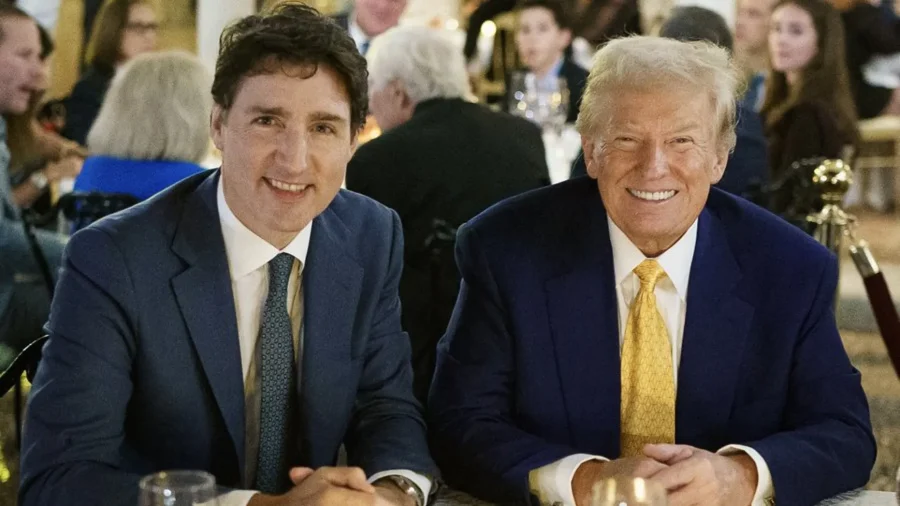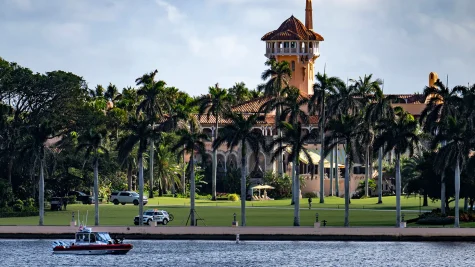
Emma Sutherland | Writer
December 12, 2024
On November 29th, 2024, U.S. President elect Donald Trump reportedly suggested to Canadian Prime Minister Justin Trudeau that Canada should become the United States’ 51st state. After Trump threatened to levy a 25% tariff on all Canadian goods, Trudeau flew out unannounced to Mar-a-Lago, Florida.
This remark, which has sparked a mix of surprise, amusement, and concern, raises important questions about the relationship between the two nations. Their political structures and the broader implications of such a great integration are at the core of these questions. While the comment was likely made in a joking or sarcastic manner, it brings into focus the complex and often misunderstood dynamics between Canada and the United States, two great neighbors on the globe. In an interview with a student at SCHS, junior Molly Whidden stated that “the comment was funny…but saying he could be governor could be seen as offensive to Canada.” When asked her opinion on if she could ever imagine Canada as a state in America, Whidden said, “That would never happen.” And left it at that.

On the surface, Trump’s suggestion may seem like a lighthearted comment, but it can be interpreted as a reflection of the deep, yet often uneasy, ties between the U.S. and Canada. Both nations share a border that is the longest undefended border in the world, have deep-rooted long-standing trade relationships, and collaborate on numerous global issues. Canada has always maintained a distinct identity, grounded in its history, culture, and policies that differ in many respects from those of the United States. While Americans often look northward with curiosity, there is a clear divide when it comes to national identity and political ideology. Trump’s remark could be seen as an oversimplification of the complexities of Canadian sovereignty or reducing an entire country to a mere extension of American interests.
The idea of Canada joining the United States is not new, and it is often framed as an intriguing “what if” scenario in historical discussions. However, the practical challenges of such a proposal are enormous. For one, Canada would have to surrender its independent governance, legal system, and distinct national policies. Also, Canada’s political landscape, with its bilingual structure, would likely clash with the U.S.’s federal system. Additionally, Canada’s international reputation as a peacekeeping nation and its independent foreign policy would face serious compromises under the umbrella of U.S. foreign policy, which often differs significantly from Canada’s more neutral approach.
In terms of economics, while Canada has strong trade relations with the United States, becoming a U.S. state would introduce a host of challenges. Canada’s economy, though highly integrated with the U.S., is distinct particularly in natural resources and healthcare. The U.S. system of free-market capitalism contrasts with Canada’s social safety nets, including universal healthcare, which would likely face significant challenges under U.S. federal rules. While the economic benefits of such a merger might be seen in terms of access to a larger market, the cultural and political ramifications of such a move would be immense.
Culturally, Canadians are shaped by a combination of French and British colonial history, as well as Indigenous cultures. Trump’s suggestion may inadvertently underscore a misunderstanding of Canadian self-perception, where national identity is rooted in being distinctly not American, even though the two nations share many similarities. For many Canadians, the notion of being absorbed into the United States would be seen as a threat to their cultural values. Moreover, the idea would likely evoke resistance from Canadians who fear the loss of their healthcare system, gun control laws, and progressive social policies.
Ultimately, Trump’s suggestion that Canada should become America’s 51st state serves as a reminder of the complex relationship between the U.S. and Canada. While the two nations have deep ties, the idea of merging them politically and culturally raises important questions about national identity, sovereignty, and independence. Though the comment was likely meant to be provocative or humorous, it highlights the challenges of navigating political relationships in a world where nationalism and globalism frequently intersect. In an interview with junior Leah Fasheh, another student at San Clemente High School, she was asked about her opinion on Trump’s arrogant and unyielding suggestion. Fasheh remarked, “It was rude suggesting a Prime Minister to become a governor, even if it was lighthearted. Isn’t that just insulting?” Attention is now being called on the enduring differences between Canada and the United States, and the importance of respecting each nation’s unique character and history in the face of such bold proposals.

Leave a Reply